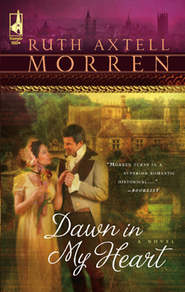По всем вопросам обращайтесь на: info@litportal.ru
(©) 2003-2024.
✖
A Man Most Worthy
Настройки чтения
Размер шрифта
Высота строк
Поля
Nick handed him the sheaf of papers, hoping his employer would notice the careful analysis he’d made of the mining company. But with a wave of his hand, Shepard dismissed Nick. Nick’s years clerking at a bank had inured him to being treated in such a manner. Clerks were usually ignored until someone needed something pressing and then barked at to produce it immediately.
But he’d looked forward to just a hint that Mr. Shepard had noticed all his extra effort.
Nick returned to his office, unable to help comparing his own footsteps with those of the girl who’d been just as summarily dismissed.
This was a mistake. Nick knew it, yet found he could do nothing to change his course of action.
Setting his alarm clock for an hour earlier than usual, he rose with a sense of foreboding that he was about to make a fool of himself. After washing and shaving, he stood a moment looking at his sparse wardrobe of black suits appropriate to a clerk. What did one wear to a game of lawn tennis?
Finally, he donned a clean white shirt and waistcoat and one of his two black frock coats, calling himself a number of names as he buttoned up the front. He looked like he should be heading to a counting house instead of outdoors. The young men he’d observed the other day had worn light-colored trousers and loose jackets.
Nick did own a straw boater—more appropriate in the country than the top hats he usually wore.
Setting it on his head, he headed out the door, not bothering to go by the dining room to see if breakfast had been laid out yet. This household was not one to rise early, he’d observed in his few days’ residence.
He walked past the garden beds, deciding he’d see if Miss Shepard was there and return at once if she wasn’t. If he saw anyone else, he’d pretend he was out for an early morning stroll. Surely the girl hadn’t meant the invitation seriously. He imagined her sleeping form. Of course she didn’t remember a casually issued invitation. Yet, she’d remembered his name. That fact still amazed him.
The grass was damp with dew. The toes of his polished shoes were already wet before he’d gone halfway across the lawn.
He recalled Miss Shepard’s words about exercise being good for his mental acuity and couldn’t help smiling. What did she know about real toil? He’d been up at the crack of dawn since he’d been able to walk, toddling out after his brothers and mother to the mill.
A riot of birdsong hailed him from the great boughs of the trees on the vast property. He realized he’d never been in such a pleasant setting. Childhood was a memory of dismal, gray surroundings and of hunger and barrenness. Since coming to London, he’d lived in a different sort of gray, from sunup to sundown in a treeless environment, going from his dingy room, downing a quick breakfast in the drab dining room crowded with half-a-dozen other young clerks, and rushing to catch the steamer across the gray Thames to the grim city of finance.
He passed the last flowerbed and looked over the hedge at the carefully clipped, emerald green lawn with its chalked lines marking out an oblong.
He stopped short at the sight of Miss Shepard holding a racket in one hand. Her head was lifted up, a hand shading her eyes from the early morning sun. He followed her line of vision and saw a bird in flight. His gaze returned to her. Her long hair fell down her shoulders like melted caramel to the small of her back. For all the loveliness of her silhouette, something about it conveyed loneliness. His gut tightened as he recalled the sound of longing in her voice toward her father.
She must have seen him out of the corner of her eye because she dropped her hand and ran over to him.
“You came!” She stopped about a foot from him, her smile wide. In that instant, all his doubts evaporated like the dew in the warm morning sun. He didn’t doubt the welcome on her face; she was too young to have learned to mask her feelings.
He found himself caught once again by her beauty. She had the most exquisite features, delicate and perfectly formed like a porcelain doll’s—pink-tinted cheeks, a perfect little nose, lips a deeper pink than her cheeks, her teeth white and even. Her heart-shaped face was framed by those silky locks of hair.
Then he looked down at the damp grass, remembering his ignorance of the game. “Yes.”
“Have you really never played tennis before?”
Did she think the average person indulged in tennis? How little she knew of life. His eyes met hers again, expecting to see triumph, but only simple interest was visible in those blue depths. “No.”
“Very well, let’s get started. I imagine you haven’t much time.”
“You imagine correctly.” What was he doing here? He should be finishing breakfast and going to his desk.
“I brought an extra racket, in case you decided to come.” She slanted him a friendly smile as she spoke, leading the way to the edge of the court.
She picked up a racket from a white wrought iron chair and a wire basket full of rubber balls. “You take this side of the net. Stand in the middle since we’re playing singles, and I’ll go on the other. I shall serve to you and you try to hit the ball back to me. Just follow my motions.”
Still amazed that she wanted to teach him, he took the racket from her and gripped it in his hand. It didn’t weigh much, its handle made of wood and wrapped in leather at the base.
She hit the ball with an underhanded swing and it came over the high net toward him. He didn’t even have to move to reach it. He swung with all his might and with a sense of triumph connected with the ball. Instead of going back over the net where he expected it to, it flew up toward the sky and landed back on his side of the net, skittering away in a series of small bounces.
His face flamed at her laughter.
“You needn’t hit it quite so hard to return it across the net,” she said in a kind tone. “Also, a lot depends on the angle of your racket when you hit the ball. Let’s try again, shall we?” She stooped and grabbed another ball from her basket.
He gripped the racket, determined to hit the ball over the net this time. He controlled his swing, barely tapping the racket against the ball and sent it dribbling into the net.
“That’s better,” she said, no hint of laughter in her voice. “Let’s try another.”
She continued sending balls his way. He missed as many as he managed to hit, but she continued encouraging him with every one.
Then he began to catch on and managed to send more balls back to her. Gradually he gained confidence because Miss Shepard was so patient and encouraging. He enjoyed watching her vitality as she ran across the court, so unlike the passive stance of the other women he’d glimpsed on the court at other times in the day. Perhaps it was because she was still a girl. She had not yet assumed the airs of a young lady just come out. Even the perspiration making her face shine appealed to him.
In some ways she reminded him of the girls of his boyhood. In their ragged frocks and bare feet, there was no room for stiffness and formality. They ran and skipped about, unfettered by social constraints or petticoats and high-buttoned shoes.
She continued sending balls his way a while longer. He was beginning to think it a tame sport when a ball went flying over the net so fast it made a whooshing sound as it cut through the air. He had to sprint to connect with it. He just made it and sent it back over.
She laughed as she went running for it. “This is the way I prefer to play!” Again, it came hard at him, and he had to jump to the side to reach it. He missed it.
“I see.” He retrieved the ball and returned to his place. He swung hard at it and again, the ball went too high.
“I’m over here, you know!” Laugher bubbled in her voice.
He winced in embarrassment at his overconfidence. Before he could run after the ball, she had gone for it. This time she resumed her gentler game. “I think we need to practice a bit more before you’re up to my speed.” The words were said to him in a friendly manner but he took them as a challenge, vowing to find a way to master this game.
Beads of sweat rolled down his temples as the sun grew warmer in the sky. At that moment, she picked up the ball and strolled to his side of the court. “You really need proper tennis garments. You must be sweltering in your suit. Why don’t you take off your coat?”
He mopped his brow, thinking how unpolished he must look compared to the suave young men she’d played with yesterday. Instead of removing his coat, he snapped open his watch. “I really must go. I need to get to work.”
She nodded, though her down-tilted face and puckered lips expressed disappointment. Then she brightened. “Have you breakfasted?”
He shook his head.
“I haven’t either. Come, you must be as hungry and thirsty as I am.” Before he could refuse, she was walking off the court. “Leave the racket here. I’m sure someone will be out to play later. Hurry, I’m famished!” She waited for him to catch up to her and the two walked back to the house.
Her next words surprised him. “Are you from London?”
He wasn’t used to anyone taking a personal interest in him. “No. I grew up in Birmingham.”
She tilted her head. “That’s funny. You haven’t any accent that I can tell.”
“That’s because my mother was—” He bit his tongue, he’d almost said “a lady.” He hesitated. “From Kent.”
She smiled. “Not far from here?”
“A bit. She was born in Whitstable.”
“Ah, by the sea.”











